OUR 2020/21 OPERATIONAL
EMISSIONS FOOTPRINT

Electricity
63% of total emissions
Scottish Water and its PFI partners consume 576GWh per annum to deliver vital water and waste services. Electricity is by far the largest contributor to our operational footprint at 160ktCO2e tonnes.
Transport & Travel 6%
This is mainly driven by the 19 million miles travelled by our fleet, along with business travel. Annually, we produce 16ktCO2e from transport and travel.
Electricity
59% of total emissions
Scottish Water and its PFI partners consumed 575GWh per annum to deliver vital water and waste services. Electricity is by far the largest contributor to our operational footprint at 146ktCO2e tonnes.
Transport & Travel 6%
This is mainly driven by the 17 million miles travelled by our fleet, along with business travel. Annually, we produced 13ktCO2e from transport and travel.
Process emissions
17% of total emissions
These are the emissions which naturally come from wastewater and the treatment of it which include N2O and CH4. Annually, this equates to 43ktCO2e.
Other 2%
This covers the use of on site fuel for standby generation, emissions from waste disposal and from refrigerant and electrical insulation gases.
Process emissions
23% of total emissions
These are the emissions which naturally come from wastewater and the treatment of it which include N2O and CH4. Annually, this equated to 58ktCO2e.
Other 3%
This covered the use of on site fuel for standby generation, emissions from waste disposal and from refrigerant and electrical insulation gases.
Gas
14% of total emissions
The use of fossil fuels comes predominantly from the gas used for the thermal drying and processing of sludge at PFI Wastewater Treatment Works and in heating our offices. Annually, we produce 38ktCO2e from gas.
Self-generated
renewable electricity -2%
We currently produce and use 53GWh
of electricity per annum helping to reduce our carbon footprint by 2%.
Gas
12% of total emissions
The use of fossil fuels comes predominantly from the gas used for the thermal drying and processing of sludge at PFI Wastewater Treatment Works and in heating our offices. Annually, we produced 30ktCO2e from gas.
Self-generated
renewable electricity -2%
We produced and used 55GWh of electricity per annum helping to reduce our carbon footprint by 2%.
OUR 2020/21 OPERATIONAL
EMISSIONS FOOTPRINT

Electricity
59% of total emissions
Scottish Water and its PFI partners consumed 575GWh per annum to deliver vital water and waste services. Electricity is by far the largest contributor to our operational footprint at 146ktCO2e tonnes.
Transport & Travel 6%
This is mainly driven by the 17 million miles travelled by our fleet, along with business travel. Annually, we produced 13ktCO2e from transport and travel.
Process emissions
23% of total emissions
These are the emissions which naturally come from wastewater and the treatment of it which include N2O and CH4. Annually, this equates to 58ktCO2e.
Other 3%
This covered the use of on site fuel for standby generation, emissions from waste disposal and from refrigerant and electrical insulation gases.
Gas
12% of total emissions
The use of fossil fuels comes predominantly from the gas used for the thermal drying and processing of sludge at PFI Wastewater Treatment Works and in heating our offices. Annually, we produce 30ktCO2e from gas.
Self-generated
renewable electricity -2%
We produced and used 55GWh
of electricity per annum helping to reduce our carbon footprint by 2%.
INTRODUCTION

TRANSFORMATION



ELECTRICITY

PROCESS
EMISSIONS

GAS &
FUEL OIL

TRANSPORT
& TRAVEL

INVESTMENT

STORING
CARBON
Scottish Water has established a framework for the supply of sustainably sourced hydrotreated vegetable oil that can be used by both Scottish Water and its construction partners. It’s a drop in fuel replacement that reduces emissions by 90% compared to conventional diesel.
Over the last year it has been widely adopted by our construction partners, displacing diesel use in excavators, cranes and other heavy plant. It is also being used to fuel generators to provide power for remote construction sites.
On our water mains rehabilitation programme its adoption is expected to reduce emissions by nearly 30%.